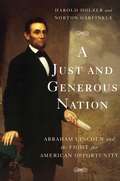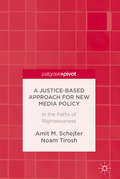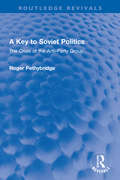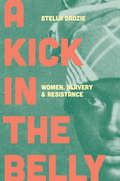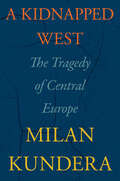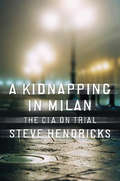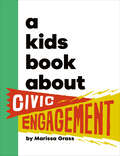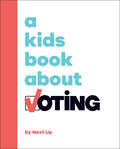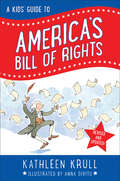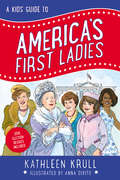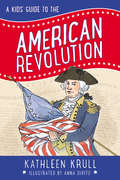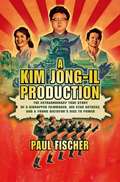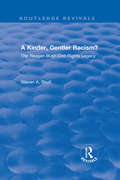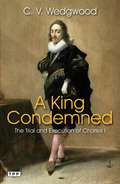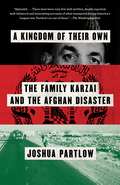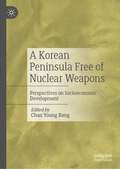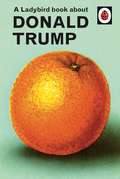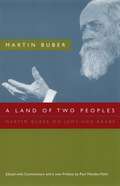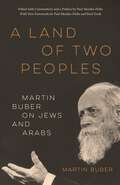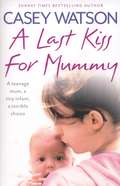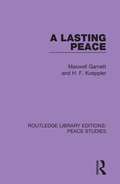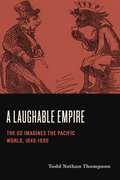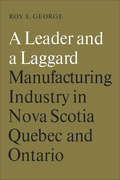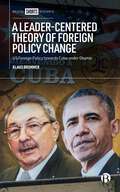- Table View
- List View
A Just and Generous Nation: Abraham Lincoln and the Fight for American Opportunity
by Harold Holzer Norton GarfinkleIn A Just and Generous Nation, the eminent historian Harold Holzer and the noted economist Norton Garfinkle present a groundbreaking new account of the beliefs that inspired our sixteenth president to go to war when the Southern states seceded from the Union. Rather than a commitment to eradicating slavery or a defense of the Union, they argue, Lincoln’s guiding principle was the defense of equal economic opportunity. Lincoln firmly believed that the government’s primary role was to ensure that all Americans had the opportunity to better their station in life. As president, he worked tirelessly to enshrine this ideal within the federal government. He funded railroads and canals, supported education, and, most importantly, issued the Emancipation Proclamation, which opened the door for former slaves to join white Americans in striving for self-improvement. In our own age of unprecedented inequality, A Just and Generous Nation reestablishes Lincoln’s legacy as the protector not just of personal freedom but of the American dream itself.
A Justice-Based Approach for New Media Policy: In the Paths of Righteousness
by Amit M. Schejter Noam TiroshIn this book, a novel approach applying the theoretical framework of distributional justice theories developed by John Rawls and Amartya Sen to the governance of today's media proposes a fresh, innovative assessment of the potential role for media in society. Three case studies describe the utilization of new media by marginalized communities in Israel - Ethiopian immigrants, the Bedouin and Palestinians - and set the stage for media policy scholars, teachers and students to discuss an analytic framework for media policy that is fresh, different, innovative and original. Departing from the utilitarian principles that dominate Western liberal regimes, and that have led to the proliferation of media systems in which control is concentrated in the hands of the few, this work proposes an alternative that focuses on redistributing power and voice.
A Key to Soviet Politics: The Crisis of the Anti-Party Group (Routledge Revivals)
by Roger PethybridgeFirst Published in 1962, A Key to Soviet Politics is the first full scale attempt to analyse the internal struggle for power in Russia since 1957. The changes in the Soviet government after the ‘Crisis’ of June 1957 are probably better documented than perhaps any other political upheaval in Soviet history, because Soviet press and party journals devoted an unusual amount of attention to the June Crisis and because information on the crisis was allowed to leak out slowly in the subsequent fall of Zhukov in 1957 and Bulganin in 1958, and the renewed attack on the ‘Anti-party’ group at the Party Congresses in 1959 and 1961. Roger Pethybridge argues that this crisis of the ‘Anti-party’ group in fact illuminated many other related topics in Soviet politics. This book will be an essential read for scholars and researchers of Soviet history, Soviet politics, European history, Russian history, and comparative politics.
A Kick in the Belly: Women, Slavery and Resistance
by Stella Abasa DadzieThe story of the enslaved West Indian women in the struggle for freedomEnslaved West Indian women had few opportunities to record their stories for posterity. Yet from their dusty footprints and the umpteen small clues they left for us to unravel, there&’s no question that they earned their place in history. Pick any Caribbean island and you&’ll find race, skin colour and rank interacting with gender in a unique and often volatile way. In A Kick in the Belly, Stella Dadzie follows the evidence, and finds women played a distinctly female role in the development of a culture of slave resistance—a role that was not just central, but downright dynamic. From the coffle-line to the Great House, enslaved women found ways of fighting back that beggar belief. Whether responding to the horrendous conditions of plantation life, the sadistic vagaries of their captors or the &“peculiar burdens of their sex,&” their collective sanity relied on a highly subversive adaptation of the values and cultures they smuggled with them naked from different parts of Africa. By sustaining or adapting remembered cultural practices, they ensured that the lives of chattel slaves retained both meaning and purpose. A Kick in the Belly makes clear that their subtle acts of insubordination and their conscious acts of rebellion came to undermine the very fabric and survival of West Indian slavery.
A Kidnapped West: The Tragedy of Central Europe
by Milan KunderaA short collection of brilliant early essays that offers a fascinating context for the Milan Kundera’s subsequent career and holds a mirror to much recent European history. It is also remarkably prescient with regard to Russia’s current aggression in Ukraine and its threat to the rest of Europe.Milan Kundera’s early nonfiction work feels especially resonant in our own time. In these pieces, Kundera pleads the case of the “small nations” of Europe who, by culture, are Western with deep roots in Europe, despite Russia imposing its own Communist political regimes in Hungary, Czechoslovakia, Poland, Ukraine, and elsewhere. Kundera warns that the real tragedy here is not Russia but Europe, whose own identity and culture are directly challenged and threatened in a way that could lead to their destruction. He is sounding the alarm, which chimes loud and clear in our own twenty-first century.The 1983 essay translated by Edmund White (“The Tragedy of Central Europe”), and the 1967 lecture delivered to the Czech Writers’ Union in the middle of the Prague Spring by the young Milan Kundera (“Literature and the Small Nations”), translated for the first time by Linda Asher, are both written in a voice that is at once personal, vehement, and anguished. Here, Kundera appears already as one of our great European writers and truly our contemporary. Each piece is prefaced by a short presentation by French historian Pierre Nora and Czech-born French political scientist Jacques Rupnik.
A Kidnapping in Milan: The CIA on Trial
by Steve HendricksA book so compelling it deserves to become one of the nonfiction classics of our time. As propulsively readable as the best "true crime," A Kidnapping in Milan is a potent reckoning with the realities of counterterrorism. In a mesmerizing page-turner, Steve Hendricks gives us a ground-level view of the birth and growth of international Islamist terrorist networks and of counterterrorism in action in Europe. He also provides an eloquent, eagle's-eye perspective on the big questions of justice and the rule of law. "In Milan a known fact is always explained by competing stories," Hendricks writes, but the stories that swirled around the February 2003 disappearance of the radical imam Abu Omar would soon point in one direction--to a covert action by the CIA. The police of Milan had been exploiting their wiretaps of Abu Omar for useful information before the taps went silent. The Americans were their allies in counterterrorism--would they have disrupted a fruitful investigation? In an extraordinary tale of detective versus spy, Italian investigators under the leadership of prosecutor Armando Spataro unraveled in embarrassing detail the "covert" action in which Abu Omar had been kidnapped and sent to be tortured in Egypt. Spataro--seasoned in prosecutions of the Mafia and the Red Brigades and a passionate believer in the rule of law--sought to try the kidnappers in absentia: the first-ever trial of CIA officers by a U.S. ally. An exemplary achievement in narrative nonfiction writing, A Kidnapping in Milan is at once a detective story, a history of the terrorist menace, and an indictment of the belief that man's savagery against man can be stilled with more savagery yet.
A Kids Book About Civic Engagement (A Kids Book)
by Marissa GrassWhat is something that makes your community special? What’s one thing you’d change to make your community even better? Improvements and growth in the places we live are made possible through civic engagement. Learn more about civic engagement and how to get active in your community. Big decisions are made all the time, and your voice matters in those discussions.
A Kids Book About Voting: Kids Are Ready (A Kids Book)
by Next UpThis book explains what voting is, how it works, and examines its influence through the lens of American history. It also challenges kids to wonder: why is it important? and who do you think should be able to vote?Meet A Kids Co., a new kind of media company with a collection of beautifully designed books that kickstart challenging, empowering, and important conversations for kids and their grownups. Learn more about us at akidsco.com.
A Kids' Guide to America's Bill of Rights
by Kathleen Krull Anna DivitoWhich 462 words are so important that they've changed the course of American history more than once? The Bill of Rights: the first ten amendments to the Constitution, the crucial document that spells out how the United States is to be governed.Newly revised and updated, packed with anecdotes, sidebars, case studies, suggestions for further reading, and humorous illustrations, Kathleen Krull's introduction to the Bill of Rights brings an important topic vividly to life for young readers.Find out what the Bill of Rights is and how it affects your daily life in this fascinating look at the history, significance, and mysteries of these laws that protect the individual freedoms of everyone--even young people.Correlates to the Common Core State Standards in English Language Arts
A Kids' Guide to America's First Ladies (Kids' Guide to American History #1)
by Kathleen Krull Anna DivitoChildren’s Book Guild Nonfiction Award-winner Kathleen Krull is an expert at bringing history to life in her engaging titles and series, including Women Who Broke the Rules, Lives of . . . , Giants of Science, and A Kid’s Guide to America’s Bill of Rights. This time, she introduces readers to the women of the White House in A Kid’s Guide to America’s First Ladies! The book includes a section introducing kids to Melania Trump.Find out what our country’s First Ladies thought, did, and advocated for as they moved into the White House.Why did the Patriots love Martha Washington?What causes did Eleanor Roosevelt support and lead?What did Jacqueline Kennedy do to establish her legacy long after she left the White House?How did Hillary Clinton turn her role as First Lady into a political career of her own?Packed with anecdotes and sidebars, a timeline of the advancement of women’s rights, and humorous illustrations and portraits, Kathleen Krull’s introduction to the First Ladies of the United States brings vividly to life the women to hold the role as they paved the way for American women in times of change.
A Kids' Guide to the American Revolution (Kids' Guide to American History #2)
by Kathleen Krull Anna DiVitoPacked with anecdotes, sidebars, quotes, and illustrations, A Kids' Guide to the American Revolution brings vividly to life the birth of our nation.Introduce young readers to the stakes, challenges, setbacks, and victories involved in the single most important event in our nation’s history, the American Revolution, with this approachable book from Kathleen Krull, a Children’s Book Guild Nonfiction Award winner.Find out what events led our young nation to go to war with Great Britain and how the Declaration of Independence, the document that continues to shape our civil rights, came to be.• Why did the colonists want independence from Great Britain?• What brought on the Boston Tea Party?• How did the Declaration of Independence initially impact women and slaves?• What did Benjamin Franklin do to convince the French to join the revolution? • How was George Washington chosen to lead the new young country?• What elements of the Declaration of Independence continue to be debated today?Kathleen Krull is an expert at bringing history to life in her engaging titles and series, including Women Who Broke the Rules, Lives of . . . , Giants of Science, and her other books in A Kids’ Guide series, A Kids' Guide to America’s Bill of Rights and A Kids’ Guide to America’s First Ladies.
A Kim Jong-Il Production: The Extraordinary True Story of a Kidnapped Filmmaker, His Star Actress, and a Young Dictator's Rise to Power, First Edition
by Paul FischerBefore becoming the world's most notorious dictator, Kim Jong-Il ran North Korea's Ministry for Propaganda and its film studios. Conceiving every movie made, he acted as producer and screenwriter. Despite this control, he was underwhelmed by the available talent and took drastic steps, ordering the kidnapping of Choi Eun-Hee (Madam Choi)-South Korea's most famous actress-and her ex-husband Shin Sang-Ok, the country's most famous filmmaker. <P><P> Madam Choi vanished first. When Shin went to Hong Kong to investigate, he was attacked and woke up wrapped in plastic sheeting aboard a ship bound for North Korea. Madam Choi lived in isolated luxury, allowed only to attend the Dear Leader's dinner parties. Shin, meanwhile, tried to escape, was sent to prison camp, and "re-educated." After four years he cracked, pledging loyalty. Reunited with Choi at the first party he attends, it is announced that the couple will remarry and act as the Dear Leader's film advisors. Together they made seven films, in the process gaining Kim Jong-Il's trust. While pretending to research a film in Vienna, they flee to the U.S. embassy and are swept to safety.<P> A nonfiction thriller packed with tension, passion, and politics, author Paul Fischer's A Kim Jong-Il Production offers a rare glimpse into a secretive world, illuminating a fascinating chapter of North Korea's history that helps explain how it became the hermetically sealed, intensely stage-managed country it remains today.
A Kinder, Gentler Racism?: The Reagan-Bush Civil Rights Legacy (Routledge Revivals)
by Steven A. ShullThis title was first published in 1993.
A King Condemned: The Trial And Execution Of Charles I
by C. V. Wedgwood Clive HolmesThe reign of Charles I, defined by religious conflict, a titanic power struggle with Parliament, and culminating in the English Civil Wars, the execution of the king, and the brief abolition of the monarchy, was one of the most turbulent in English history. Six years after the First Civil War began, and following Charles' support for the failed Royalist uprising of the Second Civil War, an act of Parliament was passed that produced something unprecedented in the history of England: the trial of an English king on a capital charge. There followed ten extraordinary weeks that finally drew to a dark end on January 30, 1649, when Charles was beheaded in Whitehall. In this acclaimed account, C. V. Wedgwood recreates the dramatic events of the trial and Charles' final days to bring vividly to life the main actors in this tragic and compelling story
A Kingdom of Their Own: The Family Karzai and the Afghan Disaster
by Joshua PartlowThe key to understanding the calamitous Afghan war is the complex, ultimately failed relationship between the powerful, duplicitous Karzai family and the United States, brilliantly portrayed here by the former Kabul bureau chief for The Washington Post. The United States went to Afghanistan on a simple mission: avenge the September 11 attacks and drive the Taliban from power. This took less than two months. Over the course of the next decade, the ensuing fight for power and money--supplied to one of the poorest nations on earth, in ever-greater amounts--left the region even more dangerous than before the first troops arrived. At the center of this story is the Karzai family. President Hamid Karzai and his brothers began the war as symbols of a new Afghanistan: moderate, educated, fluent in the cultures of East and West, and the antithesis of the brutish and backward Taliban regime. The siblings, from a prominent political family close to Afghanistan's former king, had been thrust into exile by the Soviet war. While Hamid Karzai lived in Pakistan and worked with the resistance, others moved to the United States, finding work as waiters and managers before opening their own restaurants. After September 11, the brothers returned home to help rebuild Afghanistan and reshape their homeland with ambitious plans. Today, with the country in shambles, they are in open conflict with one another and their Western allies. Joshua Partlow's clear-eyed analysis reveals the mistakes, squandered hopes, and wasted chances behind the scenes of a would-be political dynasty. Nothing illustrates the arc of the war and America's relationship with Afghanistan--from optimism to despair, friendship to enmity--as neatly as the story of the Karzai family itself, told here in its entirety for the first time.From the Hardcover edition.
A Knight in Sticky Armor (Disney Junior: Doc McStuffins)
by Disney PressDoc McStuffins doesn't just play with her toys—she heals them! Children ages 2-5 will love getting to know this super-smart six-year-old doctor with her own backyard clinic. This Little Golden Book is based on the new Disney Junior show, Doc McStuffins.
A Korean Peninsula Free of Nuclear Weapons: Perspectives on Socioeconomic Development
by Chan Young BangThis book focuses on three main subjects: the DPRK's inability to survive as a nuclear state; the importance of China’s role in encouraging denuclearization of the Korean Peninsula; and the possibility of an alternative political organization for the DPRK including a transition to a market-economy in exchange for giving up its nuclear weapons. The book approaches North Korean issues from the perspective that the regime cannot survive without nuclear weapons which, rather than being a genuine danger to other states, are bargaining chips for security and survival. The book includes views from prominent academics and practitioners, including a former British ambassador to North Korea, putting forward an ambitious set of recommendations and analyses based on hands-on experience in the region.
A Ladybird Book About Donald Trump (Ladybirds for Grown-Ups)
by Joel Morris Jason HazeleyAs we prepare to wave the President out of the White House, commemorate the past four years with this charming introduction to his very important life and his many, many friends - the perfect stocking filler this Christmas._________'When Donald won the election, he did not believe it."This election was a bad, unfair election," said Donald, about the election that he won.One day, Donald might lose an election. He will not like that election at all.And when Donald is told it is time to stop being the President, who knows what exciting things will happen next?'_________'Anyone can grow up to become the President.Or they can become President first and think about growing up later.'_________This delightful book is the latest in the series of Ladybird books which have been specially planned to help grown-ups with the world about them.Something the President himself could do with.The large clear script, the careful choice of words, the frequent repetition and the thoughtful matching of text with pictures all enable grown-ups to think they have taught themselves to cope.Featuring original Ladybird artwork alongside brilliantly funny, brand new text.Praise for The Story of Brexit:'Hilarious' Stylist'One of the Best Comedy Books of 2018' The List'The latest offering in the hilarious Ladybird for Grown Ups series is a funny mickey-take of the Brexit debate (and boy, do we need some fun)' Sunday Post
A Land of Two Peoples: Martin Buber on Jews and Arabs
by Martin BuberTheologian, philosopher, and political radical, Martin Buber (1878–1965) was actively committed to a fundamental economic and political reconstruction of society as well as the pursuit of international peace. In his voluminous writings on Arab-Jewish relations in Palestine, Buber united his religious and philosophical teachings with his politics, which he felt were essential to a life of public dialogue and service to God. Edited with commentary by Paul Mendes-Flohr
A Land of Two Peoples: Martin Buber on Jews and Arabs
by Martin BuberA new edition of Martin Buber’s many writings on Arab-Jewish relations in Palestine, with updated forewords by two preeminent Palestinian and Jewish scholars. The theologian and philosopher Martin Buber (1878–1965) was committed to radical socioeconomic reconstruction in pursuit of international peace. His voluminous writings on Arab-Jewish relations in Palestine interweave his religious and philosophical teachings with his politics, each essential to Buber’s vision of democratic and religious life. A Land of Two Peoples collects the letters, talks, and essays in which Buber advocated for a binationalism that reconciled Arabs and Jews as a solution to the conflict in the Middle East. As relevant today as when it was first published nearly fifty years ago, this edition of A Land of Two Peoples includes two forewords from the preeminent Jewish and Palestinian scholars Paul Mendes-Flohr and Raef Zreik.
A Last Kiss for Mummy: A Teenage Mum, A Tiny Infant, A Terrible Choice
by Casey WatsonAt fourteen, Emma is just a child herself - and one who's never been properly mothered. She has been in foster care several times already and when she discovered she was pregnant, and refused to have an abortion, her mother threw her out of the house. Casey and her family instantly form a strong bond with Emma's baby Roman, but dealing with Emma's behaviour and constant lack of responsibility is a far tougher challenge. And before long Casey finds she's doing something she never thought she would - covering up for Emma's shortcomings as she allows her personal involvement to colour her judgement. But the more Casey gets to know Emma the more she's convinced that with the right help and guidance this lonely and unsupported girl can become a good mother to her gorgeous little boy. That's what makes it even harder when Casey and her family have to make a stark choice: to hold on to Emma or look after Roman; to help a teenage girl desperate to turn her life around, or offer an innocent baby a safe home and much-needed good start in life.
A Lasting Peace (Routledge Library Editions: Peace Studies)
by Maxwell Garnett H. F. KoepplerFirst published in 1940, the original blurb reads: Here is an inquiry how to make a just and lasting peace when the danger of further aggression by Herr Hitler’s Germany has been removed. A feature of the book is the stress it lays on Germany’s part in forming and fostering a new world order. When the World War ended, cries of "Hang the Kaiser" and "Squeeze the German Orange" hampered the peacemakers and helped to spoil the peace. If that mistake is not to be repeated, public opinion must be prepared for whatever apparent sacrifices may be involved in passing from the old civilization to the new. And if the foundations of the new system are to be well and truly laid, they must rest not only upon the undertakings of governments, but also upon the convictions and the sentiments, the thoughts and the feelings, of individual men and women. To that end people should begin now to think over and discuss with one another how the errors of Versailles are to be avoided and how we are to do better this time. This book by Dr Maxwell Garnett, for 18 years the secretary of the League of Nations Union and Dr H. F. Koeppler will help such thought and talk to prepare the way of lasting peace. Dr Koeppler shows how essential is Anglo-French solidarity in the interests of Germany herself. For the rest he is chiefly concerned with the conflict between German democracy and Prussian Junkerdom as he defines it. He suggests how this conflict may be resolved when the Nazi disciples of the Junkers have left the scene and how Germany may then play an equal part in a new Europe.
A Laughable Empire: The US Imagines the Pacific World, 1840–1890 (Humor in America)
by Todd Nathan ThompsonIn the nineteenth-century United States, jokes, comic anecdotes, and bons mots about the Pacific Islands and Pacific Islanders tried to make the faraway and unfamiliar either understandable or completely incomprehensible (i.e., “other”) to American readers. A Laughable Empire examines this substantial archival corpus, attempting to make sense of nineteenth-century American humor about Hawai‘i and the rest of the Pacific world.Todd Nathan Thompson collects and interprets these comic, sometimes racist depictions of Pacific culture in nineteenth-century American print culture. Drawing on an archive of almanac and periodical humor, sea yarns, jest books, and literary comedy, Thompson demonstrates how jokes and humor functioned sometimes in the service of and sometimes in resistance to US imperial ambitions. Thompson also includes Indigenous voices and jokes lampooning Americans and their customs to show how humor served as an important cultural contact zone between the United States and the Pacific world. He considers how nineteenth-century Americans and Pacific Islanders alike used humor to employ stereotypes or to question them, to “other” the unknown or to interrogate, laughingly, the process by which “othering” occurs and is disseminated.Incisive and detailed, A Laughable Empire documents American humor about Pacific geography, food, dress, speech, and customs. Thompson sheds new light not only on nineteenth-century America’s imperial ambitions but also on its deep anxieties.
A Leader and a Laggard: Manufacturing Industry in Nova Scotia, Quebec and Ontario
by Roy GeorgeAdvanced countries in all parts of the world are concerned with the geographical unevenness of their development. Canada's preoccupation is with the Atlantic provinces, and for years government departments and agencies have tried to improve the region's economy. However, the evidence suggests that the economic gap between the Atlantic provinces and the rest of Canada has remained remarkably constant. This persistent gap has no shortage of explanations: lack of resources, the cost of transportation, insufficient markets, and a poor supply of skilled labour are problems often mentioned. This study investigates how far these and other factors account for slow industrial development. The author compares two regions of Canada: Quebec and Ontario, which together are considered the industrial leader; and Nova Scotia, the industrial laggard. He compares the costs of inputs for an average manufacturing firm in Nova Scotia from 1946 to 1962 with what those costs would have been had the firm been located in the Quebec-Ontario region. The analysis includes relative wage rates, labour productivity, the costs of materials, energy, and fuel, rates of interest and investment, transportation charges, levels of local taxation, and the supply of business enterprise. Canadian official statistics form the main basis of the comparisons, but where these are inadequate, information derived from three special studies carried out by the author is used. Dr George then explores the implications of the study's findings for public policy. He examines the relative cost and effectiveness of tax concessions, capital grants, industrial estates, transportation subsidies, and other remedial measures often advocated. Although the book uses a case study approach involving just two regions, it is relevant to the general theory of the location of industry, to regional economic policies, and to industrial development. It is essential reading for politicians and public servants who shape regional policies; for industrial promotion managers of municipalities; for businessmen choosing sites of new enterprises, and the consultants who advise them; for academics concerned with the theoretical aspects of the location of industry; and for anyone interested in industrial development.
A Leader-Centered Theory of Foreign Policy Change: U.S. Foreign Policy toward Cuba under Obama
by Klaus BrummerForeign policy analysis is a major part of international relations scholarship, yet many models are ill-equipped to examine the effects of individual leadership on policy. Written by a leading figure in the field, this innovative account challenges traditional views in international relations by theorising the influence of individual leaders on foreign policy change. It examines how and why leaders have shaped policy throughout history, showcasing Obama's Cuba pivot as a prime example. Using an original theoretical approach, this book will appeal to academics and practitioners in foreign policy analysis, international relations and comparative politics.
